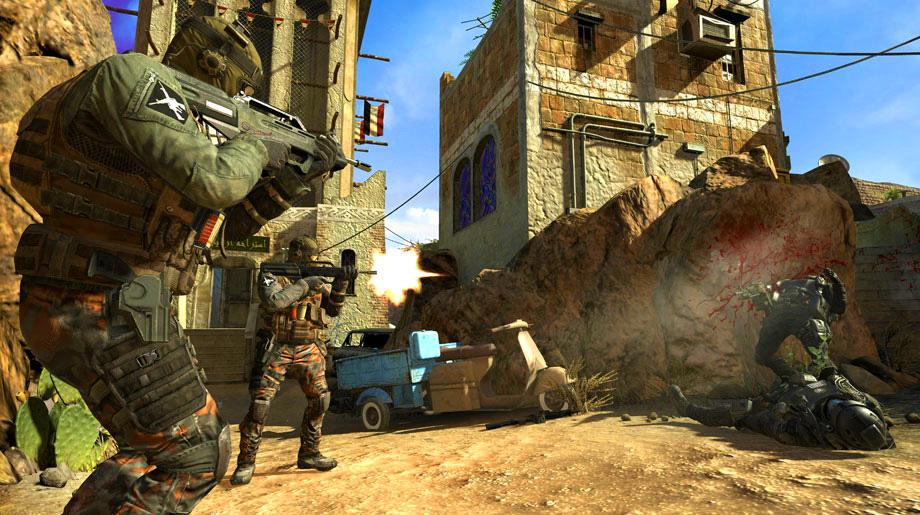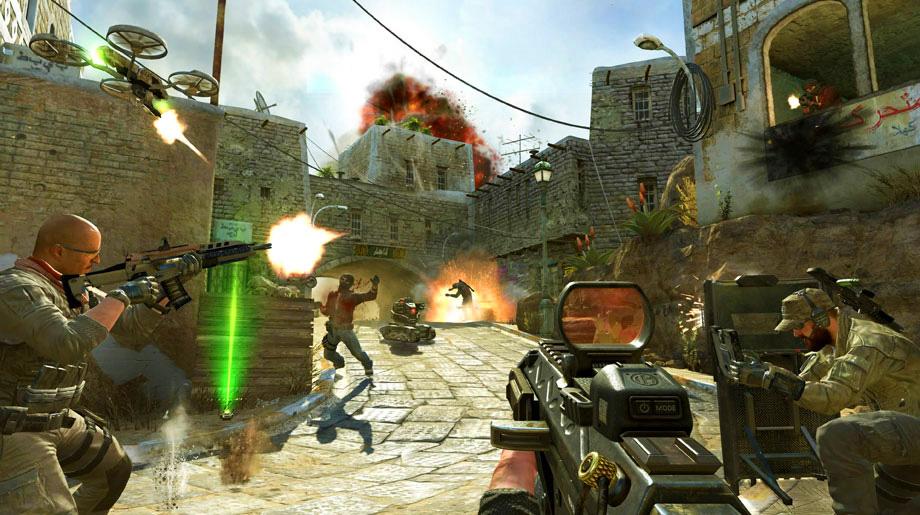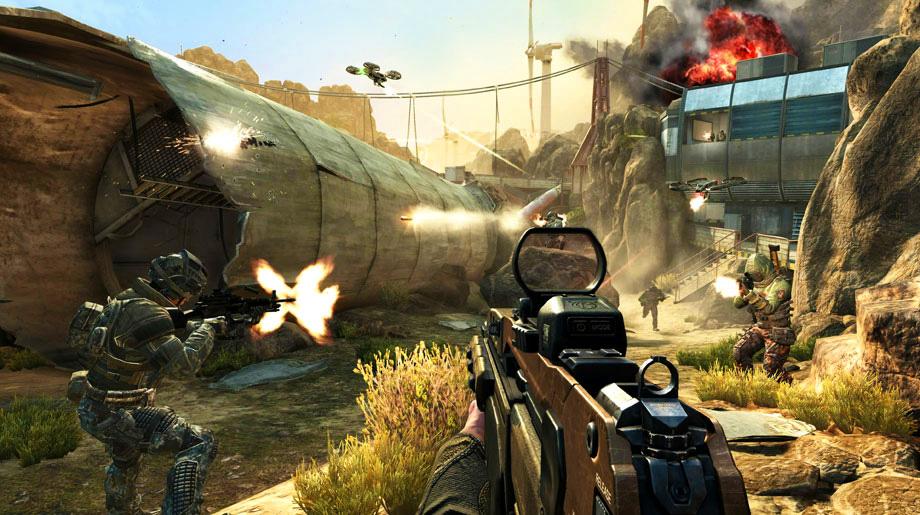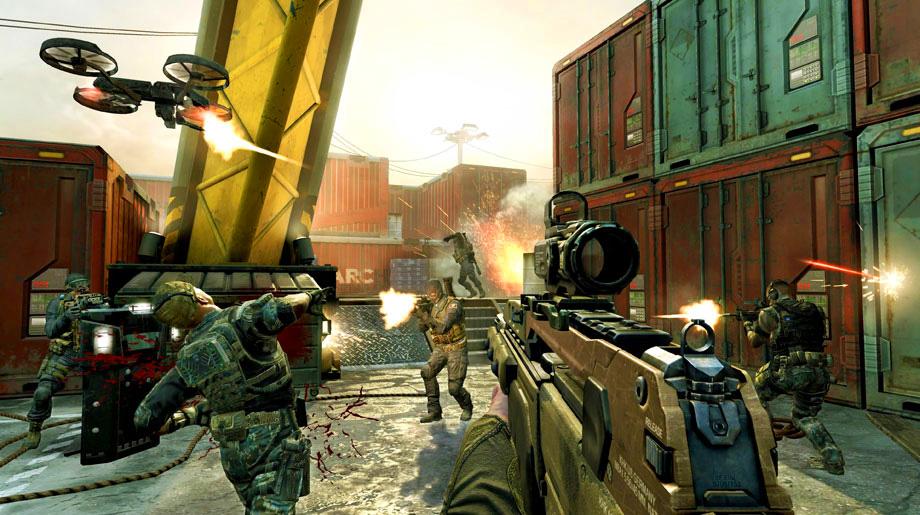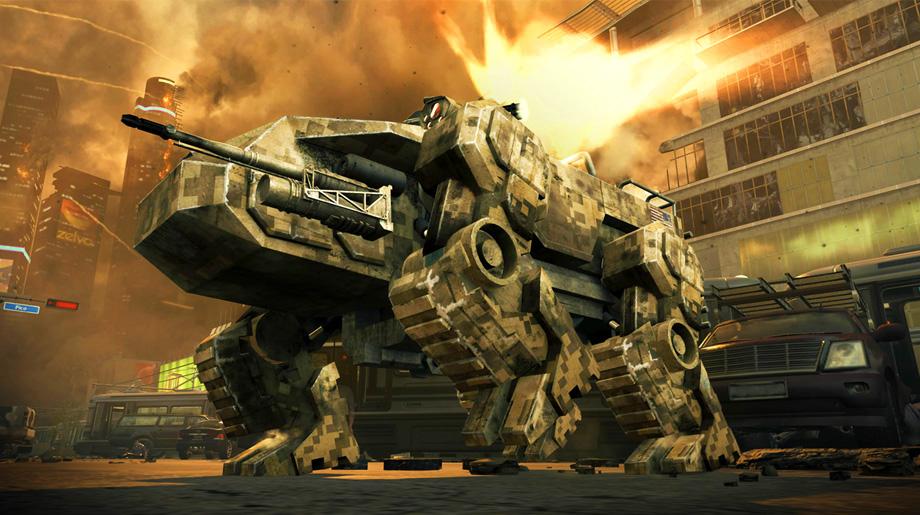
Dave Vonderhaar isn’t an accused murder, a philandering politician or even a particularly contentious celebrity. But lately he’s been finding himself on the receiving end of some particularly nasty death threats.
In the eyes of a handful of Call of Duty players, Treyarch’s design director of Black Ops 2 committed a worse in than murder, adultery or bad reality TV: He screwed with their game.
Making an example out of someone posting wild death threats on the Call of Duty forums wouldn’t necessarily work…
The controversial update that Vonderhaar helped author made myriad tweaks to the game: The Ballista and the DSR 50 sniper rifles fired slower after the patch, and the AN-94 assault rifle did a bit less damage than it used to. These seem like the small balance changes to any rational, games-knowledgeable observer. Judging by some of the responses on Twitter, though, you’d think Vonderhaar himself had just murdered every puppy on Earth and then laughed about it.
“FIX THE SNIPERS OR I’LL FUCKING KILL YOU! #fuckvonderhaar #BRINGSNIPERSBACK #vonderfag,” said one astoundingly intelligent winner on Twitter. “im ganna rape your wife and kid so fucking hard,” stated another Poet Laureate hopeful. You also have to admire the simple and direct approach taken by this gentle philosopher, who informed the developer, “I will find you Vonderhaar and I will kill you.”
More than two days after the patch was released on July 23, roughly 100 vile, grammatically incorrect, and disturbing threats and insults were still being hurled at Vonderhaar every hour. These barbs weren’t directed at Treyarch or even Activision, but the man himself, and all because an imaginary gun fires in 0.4 seconds rather than 0.2 seconds.
But you can’t just threaten to kill people on Twitter without consequences … can you?
A history of rage
Not surprisingly, none of the gamers responsible for the tweets above agreed to an interview – and one professed that he was only 14.
For his part, Vonderhaar remained remarkably civil in the face of mounting death threats. “Let me put some perspective into your life because I do care about what you say,” said the game designer. “Not sure these fractions of a second are worth the threats of violence.”
Apparently, he’s used to it. “[Vonderhaar] often gets told he should die in a fire or kill himself or is a horrible person,” explained Activision community manager Dan Amrich on his blog, One of Swords. “If anybody thinks for a second that this is OK, it is not. But if the loudest voices in the Call of Duty ‘community’ act like an angry mob instead, guess how the entire world views Call of Duty?”

“This is why the world often does not take gaming seriously; this is why gamers are assumed to be immature, whiny assholes. Because the immature, whiny assholes are louder.”
He’s not wrong. The developers of games like League of Legends, Diablo III, Team Fortress 2, and many, many others have to contend with a belligerent vocal minority saying unsavory things on social-networking sites and forums every single day. It’s a sad fact of the Internet world.
Members of the gaming industry sometimes get prickly on Twitter as well. Look no further than Adam Orth, formerly of Microsoft. He told Xbox fans to “deal with it,” in response to a rumor that the Xbox One would require a persistent Internet connection. Orth didn’t curse anyone out or threaten to chop their legs off, but his statements escalated from glib to rude pretty quickly, and he was no longer employed at Microsoft within a week. Orth was held accountable.
What about the audience, though? A Twitter user with a feeble grasp on the English language can’t be fired from Twitter or from playing Call of Duty. How are they held accountable?
“That’s a tricky problem that no one has an answer to yet unfortunately,” says Elizabeth Tobey, Trion Worlds’ director of community. Tobey moderates large crowds of gamers in the massively multiplayer online games, Defiance and Rift.
“We can’t control the person on the other side of the conversation, so instead of trying to wipe all the negativity off the playing field, we have to train ourselves in how to react to it and change the tone of conversation,” she explains. “For that, you need oodles of patience and grace under pressure. Our words represent us, and by extension, our company – whether it’s a stickied post on a forum or a late-night tweet on our personal account. We have to be accountable for what we say.”
The majority of messages aimed at Vonderhaar weren’t just upset players blowing off steam and hoping to get new changes. They were scary and violent, just as much as they were gross and poorly written. But were they illegal?
The letter of the law
As with most legal issues, the answer isn’t clear cut. Michael J. Donohue of law firm Kreder Brooks Hailstone points to Title 18 United States Code section 875:
Whoever transmits in interstate or foreign commerce any communication containing any threat to kidnap any person or any threat to injure the person of another, shall be fined under this title or imprisoned not more than five years, or both.
… developers … have to contend with a belligerent vocal minority saying unsavory things on social-networking sites and forums every single day.
“So the keywords are a ‘threat to injure the person of another,’” says Donohue. Federal courts, he says, have basically interpreted that to mean: “Is it serious and are you intimidating someone into taking action?”
In the eyes of U.S. judicial system, the Twitter all-stars that attacked Vonderhaar were prosecutable. They were threatening the designer because they wanted him to change the game back to the way they wanted, and they were willing to threaten him with death, one poorly spelled word at a time. The only question is whether they planned to follow through on those threats. Are they just being miserable jerks or do they actually plan on hurting Vonderhaar?
According to Donahue, the 2009 case of United States v. Jongewaard determined that for the purposes of this section in 18 USCS, a statement ‘constitutes threat if it expresses intention to inflict harm, loss, evil, injury, or damage on another, regardless of whether that person making a threat has discernible purpose.”
“There’s a lot of discretion given to prosecutors and investigating FBI agents,” says Donohue, “I’ve had personal experience.”

In his time defending counties and local governments from lawsuits by prisoners and constituents, Donohue once made a motion to dismiss a complaint that he says wouldn’t have been Constitutional. The man making it wasn’t pleased.
“I got an alarming letter from the person who made the complaint. He told me that the Lord regularly makes use of the angel of death and that I’m easy to find. Now when I turned it over to the FBI agent, he said ‘This just isn’t graphic enough for us to determine intent.’ I checked it out at the county level and this guy had never done anything so I didn’t pursue it.”
No easy solution
For game developers, there are options. Even if Treyarch and Activision didn’t necessarily think these goons were actually planning to hurt Vonderhaar, they might be able to prosecute them for harassment. As Donohue says, every state also has a terroristic threat statute, so there are other legal avenues available. Some states actually include much higher penalties for making terroristic threats than the federal statute. Publishers have their own process for handling such situations.
Trion is no different. Tobey wouldn’t go into detail about what specific actions Trion has taken in the past, but the developer doesn’t brush off volatile commenters either. “We treat threats seriously and take the necessary steps to protect our team, be it legal or otherwise,” she says.
… they wanted him to change the game back to the way they wanted, and they were willing to threaten him with death, one poorly spelled word at a time.
“In past roles, I’ve had to deal with some of those situations for both dev team members and myself and they’re never fun. You can’t chalk it up to ‘they’re just angry and saying stuff on the Internet’; it’s too much of a risk.”
There’s no doubt that Trion and other game publishers take these types of threats seriously and deal with them on a case-by-case basis, whether through legal action or just community moderation. Forum members can be banned, either temporarily or permanently.
Trion even contracts out moderation to another company that just handles ornery forum goers. But “making an example out of” a troublemaker is tricky business. The RIAA knows this well. It tried for a decade to curb illegal music downloading by prosecuting a small number of people downloading songs. Those multi-million dollar lawsuits didn’t stop anyone from downloading more content, but they did give the organization a PR black eye. Making an example out of someone posting wild death threats on the Call of Duty forums wouldn’t necessarily work either.
“They’d be well advised not to say, ‘I want to make an example out of them!'” says Donohue, “What works is saying, ‘I received this communication and our designer is very concerned. He’s looking both ways. He’s worried about his family.’ And you say, ‘I want this person prosecuted.’”
“Then you get an FBI agent, a district attorney, a U.S. attorney interested. The next thing the person making those threats will hear is a knock at the door. He’ll be arrested, arraigned, and he’ll have a bail hearing. When you’re threatening to kill somebody, that bail is high.”
Legal action may not be the best recourse for curbing the sort of ugliness that Vonderhaar met after the most recent Black Ops II patch. Really, that’s true for any change to a popular game made by its developers. The only thing that’s going to stop people from saying awful, miserable things is to try again and again to encourage civility. Responding to threats of rape, murder, and a seemingly endless torrent of mental bile with politeness is the only way to stop people from using those vicious tactics in the future.
“I can’t tell you how many times a gamer has started a conversation with me, completely livid about something. But I find those times some of the most rewarding in my job,” says Tobey. “Sometimes it takes several emails, or days of posting back and forth on Twitter or the forums. I’ve even had some phone calls that have lasted almost an hour.”
“Once people realize there are actual humans out there, rather than this monolithic corporate conglomerate, they become far more rational and appreciative. Sure, that takes putting yourself out there, and sometimes having to rise above some particularly vitriolic behavior, but in the end if you can turn that serious negativity into something positive, that’s huge.”
Watch what you say
This doesn’t mean that the troglodytes flooding Twitter with their hateful, moronic threats have carte blanche to continue harassing people. While many prosecutors interpret intent in a metered way, figuring that some teenager ranting about how he’s going to kill a game designer is just an idiot, there are plenty of recent, disturbing examples of people making stupid but idle threats online, and then being thrown in jail as a result.
Justin Carter, a 19-year-old from New Braunfels, Texas said he was going to shoot some kindergartners on Facebook when he was joking around with a friend. Under Texas’ terroristic threat statute, he faces up to 10 years in jail. In an age when electronic communication is omnipresent but largely lacking the ability to convey tone and intent, it is dangerous to be saying ugly things in a public forum, even if it’s just a joke in bad taste.
“I would be concerned if I were a member of the gaming community,” says Donohue, “Because some people think that that community is often off in its own little world. The world displayed in these games specifically, a violent fantasy world. If you’re threatening to kill somebody, to bear physical violence over changes in a game, you better think twice because you’ll be facing a very vivid real-world experience.”
